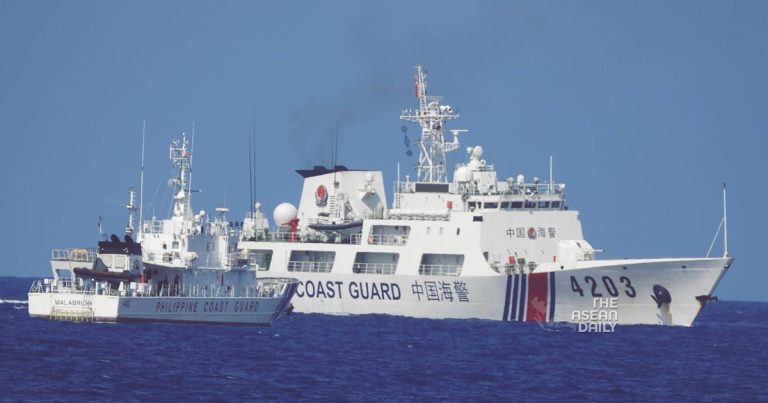3-10-2023 (MANILA) China’s persistent aggression in the disputed West Philippine Sea territories is increasingly unsettling Filipinos, as revealed by a recent survey conducted by Oculum Research and Analytics.
In the poll, 1,200 respondents expressed their trust levels in various countries, and China emerged as the least trusted country. A total of 51% of the respondents registered their disapproval of China, while the United States, China’s global rival, received the highest approval rating at 62%.
Tensions escalated when China installed a 300-meter floating barrier along Scarborough Shoal to block the entry of the Philippine Coast Guard and fishermen, a move labeled as a “clear violation of international law” by Philippine authorities. President Ferdinand Marcos Jr. subsequently ordered the removal of a portion of the barrier.
Commodore Jay Tarriela, the spokesperson for the Philippine Coast Guard in the West Philippine Sea, pledged to eliminate any future obstructions that may hinder the livelihood of fisherfolk.
Recent allegations accuse Chinese maritime militia vessels of extensive coral harvesting that has resulted in the damage and bleaching of corals along Rozul (Iroquios) Reef and Sabina (Escoda) Shoal, both located within the Philippines’ exclusive economic zone (EEZ).
The damage to the coral reefs has sparked concern, with Vice Admiral Albert Carlos, the head of the Western Command of the Armed Forces of the Philippines, pointing out the extensive harm caused by coral harvesting and debris.
The United States has raised concerns about China’s billion-dollar disinformation campaign, warning that it poses a threat to the “integrity of the global information space.” James Rubin, the State Department’s Global Engagement Center special envoy and coordinator, emphasized China’s ambition to achieve information dominance in key regions worldwide.
The ongoing tensions have also prompted accusations of China’s “psychological warfare” in the Philippines, as the country seeks to undermine the Philippines’ stance on the West Philippine Sea. This is achieved through “political operators” engaging in propaganda and exploiting political divisions among Filipinos.
According to Dennis Coronacion, Oculum’s chief political analyst and a political science professor at the University of Santo Tomas, the numerous incidents of harassment against the Philippine Coast Guard and Filipino fishermen by the Chinese Coast Guard in disputed waters have led to negative public perception of China.
Despite the efforts of former President Rodrigo Duterte to foster closer ties with China and its leader, Xi Jinping, Beijing’s persistent aggression has left a lasting impact on the Filipino consciousness. Manny Mogato, a Pulitzer Prize-winning journalist, explained that even during Duterte’s presidency, the most popular leader at the time, he was unable to significantly influence Filipinos to raise trust ratings in China. Filipinos’ values of democracy, freedom, and the rule of law have made them more inclined to trust Western countries like the United States and Canada.
China has refused to acknowledge the 2016 ruling of the Permanent Court of Arbitration, which declared that China’s nine-dash line on maps violated the Philippines’ 200-nautical mile EEZ. Recently, the Chinese Foreign Ministry cautioned the Philippines against making further provocations.
The survey conducted by Oculum obtained responses from 1,200 Filipinos nationwide, randomly selected through a computer-assisted tool. The survey has a ± 3-percent margin of error at the national level.




